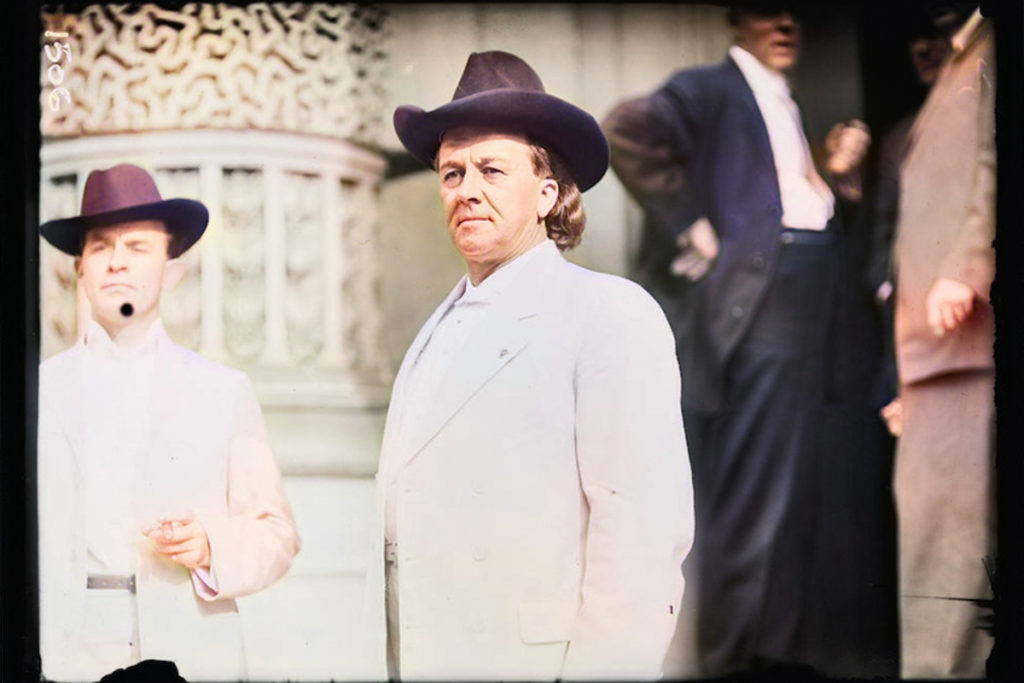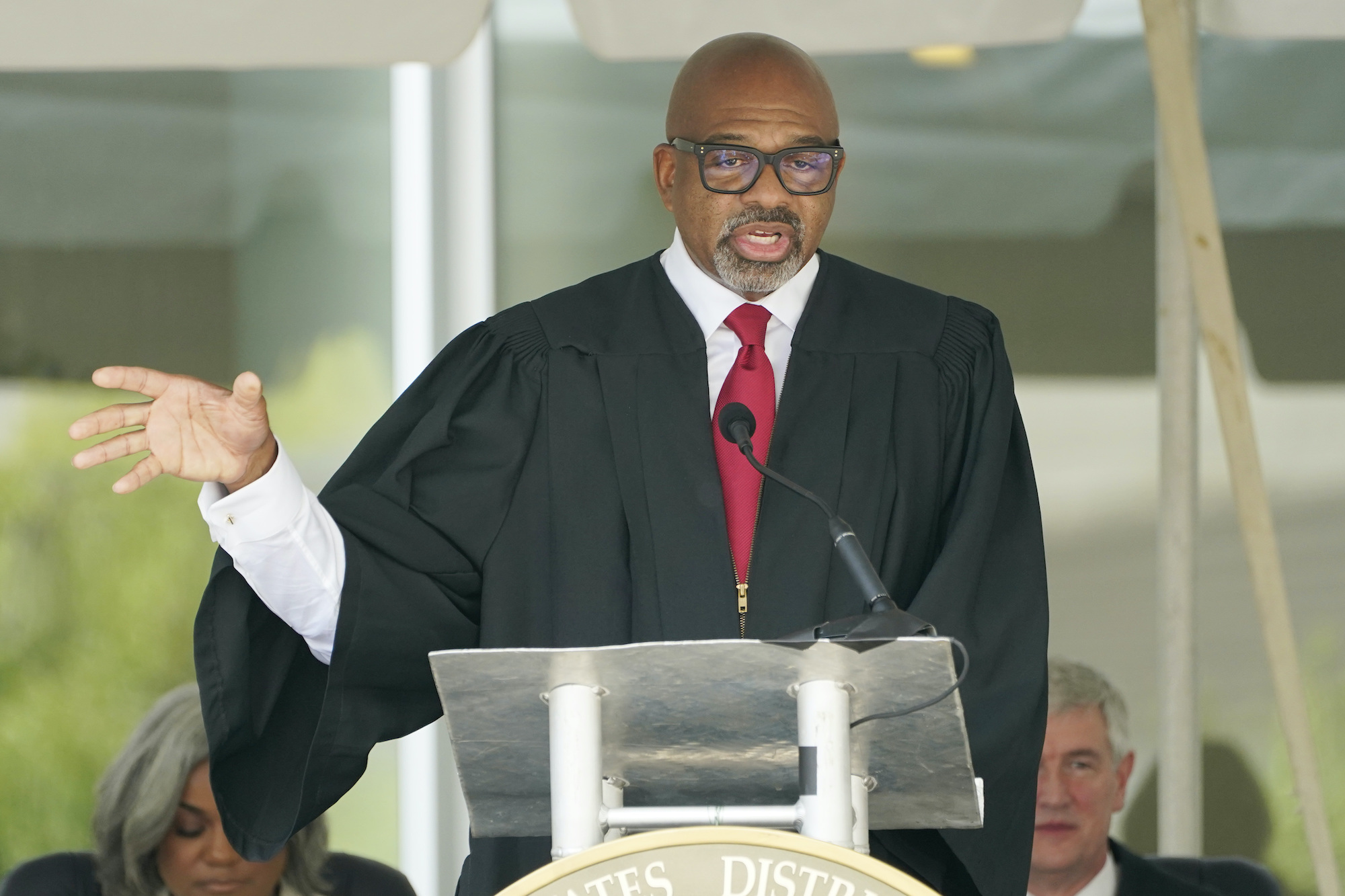Mississippi Attorney General Lynn Fitch is urging the U.S. Supreme Court not to review the State’s Jim Crow-era felony disenfranchisement law, telling the justices that the State “purged any taint from the 1890 law” with changes in 1950s and 1960s—a period when Mississippi was openly defying federal desegregation orders.
The case, Harness v. Watson, is over Section 241 of the Mississippi Constitution, which white-supremacist leaders adopted in 1890 in an attempt to disenfranchise Black residents for life. The law designated certain crimes that white lawmakers at the time believed Black people were more likely to commit as “disenfranchising crimes.”
The Mississippi Center For Justice is representing two disenfranchised Black plaintiffs in the case, Roy Harness and Kamal Karriem. On Aug. 24, the conservative 5th U.S. Circuit Court of Appeals in New Orleans admitted in a ruling that Section 241 was “steeped in racism,” but the court’s white, conservative majority voted to uphold it by claiming Mississippi has made enough changes since 1890 to override the racist “taint” of Jim Crow.
MCJ asked the U.S. Supreme Court to hear an appeal last October, with lead lawyer Rob McDuff calling the law a “remaining vestige of the malicious 1890 plan to prevent an entire race of people from voting in Mississippi.”

Fitch filed the brief-in-opposition to the request on Jan. 3, 2023, arguing that states have “broad” power to deny citizens who commit crimes the right to vote. The brief points to the 14th Amendment, which says states may deny citizens “the right to vote” for “participation in rebellion, or other crime.” Her brief concedes, however, that the Mississippi Supreme Court once admitted that lawmakers designed the law to prevent Black men from voting.
“Restrained by the federal constitution from discriminating against the negro race, the convention discriminated against its characteristics and the offenses to which its weaker members were prone,” the Mississippi Supreme Court explained in 1896.
“Based on the view that black Mississippians were ‘given rather to furtive offenses than to the robust crimes of the whites,’ in the 1890 disenfranchisement provision, ‘[b]urglary, theft, arson, and obtaining money under false pretenses were declared to be disqualifications, while robbery and murder and other crimes in which violence was the principal ingredient were not,’” Fitch’s brief says, reciting the 1896 opinion.
‘To Secure Permanent White Rule’
During the Reconstruction era, newly emancipated Black Mississippians made enormous gains as Black men gained the right to vote, but in 1890, white Mississippi lawmakers began drafting a new constitution riddled with Jim Crow laws. The new system instituted an explicitly white-supremacist regime, with its drafters bent on disenfranchising, criminalizing and denying opportunity to the state’s Black residents.
The legislative committee that drafted Mississippi’s 1890 Constitution was initially explicit in its white-supremacist goals. They adopted a resolution declaring that “it is the duty of this Com. to perform its work in such a manner as to secure permanent white rule in all departments of state government and without due violence to the true principles of our republican system of government.”

The lawmakers later revised the resolution, changing “white rule” to “intelligent rule.” Contrary to popular misconception, Jim Crow laws usually masqueraded as colorblind, but on the floor of the Mississippi Constitutional Convention, lawmakers were open about their intent.
“I will agree that this is a government by the people and for the people, but what people? When this declaration was made by our forefathers, it was for the Anglo-Saxon people. That is what we are here for today—to secure the supremacy of the white race,” Franklin County delegate J.H. McGehee said to applause from his fellow lawmakers at the 1890 convention as he vowed to strip voting rights from Black residents “even if it does sacrifice some of my white children, or my white neighbors or their children.”
After Mississippi adopted the Jim Crow law as part of its constitution, along with other provisions like poll taxes and literacy tests, James K. Vardaman, one of its drafters, explained the goal: “There is no use to equivocate or lie about the matter … Mississippi’s constitutional convention of 1890 was held for no other purpose than to eliminate the n–ger from politics. Not the ‘ignorant and vicious,’ as some of the apologists would have you believe, but the n–ger,” he said. Supporters hailed Vardaman, who served as a Mississippi governor and U.S. senator, as the state’s “Great White Chief.”
‘Mississippi Has Done What Alabama Had Not’
Everything changed, Attorney General Fitch’s office argues in her Jan. 3 brief, when Mississippi began tweaking the law in the middle of the 20th century. The State amended the Constitution in 1950, removing burglary as a disenfranchising crime. In 1968, the State made additional changes by voter referendum, including by adding murder and rape to the disenfranchising crimes in Section 241.” The 1968 changes came after a federal commission released a report citing various racist provisions in Section 241, including poll taxes.
Later, in the 1980s, a Mississippi legislative committee recommended amending Section 241 to expand the State’s disenfranchisement laws to include all felonies, except manslaughter and federal tax evasion, and to restore voting rights after a sentence is completed. Instead, the Legislature adopted a task force’s recommendation to leave Section 241 “as is.”

“Petitioners’ claim fails because the State’s 1950 and 1968 enactments purged any taint from the 1890 law. … In 1968, several significant changes were made Section 241, including the addition of ‘rape’ and ‘murder’ as crimes resulting in denial of the franchise. App. 4a. Those changes responded to the federal Civil Rights Commission’s 1965 report faulting the State for parts of its voting laws that had been adopted for discriminatory reasons,” Fitch’s Jan. 3 brief says.
Additionally, the State’s brief says, “Section 241 must stand for the independent reason that events of the mid-1980s show ‘that Section 241 would have been passed in its current form without racial motivation.’” The brief also dismissed MCJ’s claims that the Harness v. Watson is analogous to Hunter v. Underwood, a 1985 case in which the U.S. Supreme Court unanimously struck down a 1901 criminal disenfranchisement law in Alabama because it was designed to disenfranchise Black residents.
“Alabama as a State had not acted to purge its disenfranchisement law of animus,” Fitch’s brief says. “But Mississippi repeatedly has done what Alabama had not. Its legislature and voters revisited its provision and twice adopted a new law without any improper motivation.”
But in the period when Mississippi made changes to Section 241, Mississippi’s white leaders and white residents were engaged in an often violent and deadly campaign of mass resistance to federal civil-rights laws and protections. Even in 1968, long after the Brown v. Board ruling, Mississippi still maintained segregated public schools until the U.S. Supreme Court issued a final order to desegregate in 1969.
‘The Express Aim of Enshrining White Supremacy’
In an Aug. 24 dissent against the 5th Circuit’s majority opinion, Judge James E. Graves Jr. cited U.S. Sen. James Z. George, who said in 1890 that “the plan” behind the 1890 Jim Crow Constitution was “to invest permanently the powers of government in the hands of the people who ought to have them—the white people.” George is one of two Mississippians that the State honors with a statue at the U.S. Capitol; the other is Confederate President Jefferson Davis.
“In 1890, Mississippi held a constitutional convention with the express aim of enshrining white supremacy. … Today the en banc majority upholds a provision enacted in 1890 that was expressly aimed at preventing Black Mississippians from voting,” the judge wrote on Aug. 24. “And it does so by concluding that a virtually all-white electorate and legislature, otherwise engaged in massive and violent resistance to the Civil Rights Movement, ‘cleaned’ that provision in 1968. Handed an opportunity to right a 130-year-old wrong, the majority instead upholds it.”
Graves is a Black native of Clinton, Miss., whom former President Barack Obama appointed in 2011.

Today, Attorney General Fitch’s Jan. 3 brief claims, the felony disenfranchisement law “has no discriminatory effect” despite its Jim Crow origins. She cited the fact that, between 1994 and 2017, “about 22.6% of convictions for black Mississippians (25,353/112,356)” and “about 21.2% for white Mississippians (16,400/77,216) are disenfranchising.”
Still, despite the fact that Black Mississippians make up 38% of the state’s population compared to white Mississippians who make up 59%, more Black Mississippians are disenfranchised overall. Between 1994 and 2017, about 61% of those disenfranchised due to crimes were Black, while about 39% were white. A 2017 Vera report found that Black Mississippians are incarcerated at about 2.5 times the rate of white Mississippians.
In December 2022, the Legal Defense Fund filed an amicus brief, urging the U.S. Supreme Court to hear the case and strike down Mississippi’s voter disenfranchisement law.
“Section 241 is Jim Crow law, which created a deliberate and invidious scheme to disenfranchise Black people,” LDF Assistant Counsel Patricia Okonta said in a statement last month. “Today, Black Mississippians continue to be disproportionately harmed by this provision. While the state is home to the highest percentage of Black Americans of any state in the country, it has not elected a Black person to statewide office since 1890. It is imperative that the Supreme Court intervene—as it has in other cases where overt racism undermines the principle of equal justice under law—to eliminate this unconstitutional provision.”
The U.S. Supreme Court will hear Harness v. Watson if at least four of the nine justices agree to the petition.










